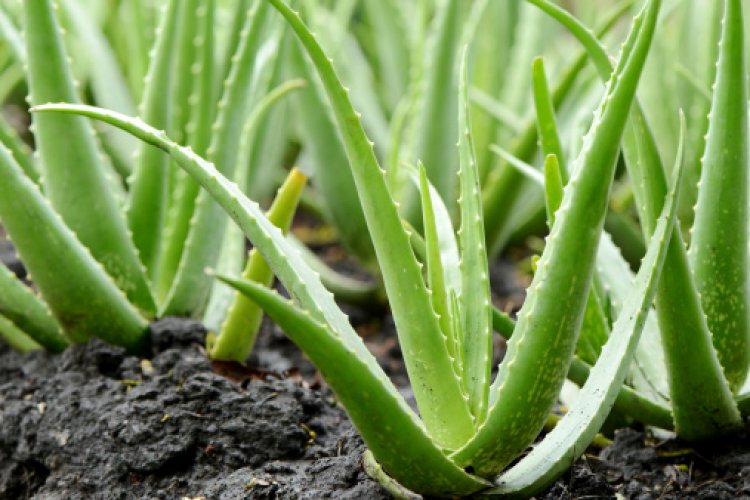The Healing Powers of Aloe Vera: An In-Depth Look
Explore the amazing healing properties of Aloe Vera in this in-depth look at the benefits and uses of this versatile plant. Discover how it can be used to improve skin health, alleviate pain, and boost immunity.

Aloe vera is a succulent plant that is native to Africa but is now widely cultivated throughout the world. The plant is known for its medicinal properties, which have been used for thousands of years in traditional medicine. The ancient Egyptians called it the "plant of immortality" and used it to treat a wide range of ailments, including wounds, burns, and skin conditions. The plant has also been used in traditional Chinese medicine and Ayurveda for its anti-inflammatory and healing properties.
Nutritional and medicinal properties of Aloe Vera, including vitamins, minerals, and antioxidants
The Nutritional and Medicinal Properties of Aloe Vera:
-
-
Vitamins:
Aloe vera is a rich source of vitamins, particularly vitamins A, C, and E, which are essential for maintaining good health. -
Minerals:
Aloe vera also contains a variety of minerals, including calcium, magnesium, and zinc, which are important for maintaining strong bones and teeth. -
Antioxidants:
Aloe vera contains antioxidants such as beta-carotene, which can protect the body from damage caused by free radicals. -
Enzymes:
Aloe vera contains enzymes such as amylase and lipase, which can help improve digestion and break down food more effectively. -
Polysaccharides:
Aloe vera contains polysaccharides, which are known for their anti-inflammatory properties and can help to reduce pain and swelling in the body. -
Amino acids:
Aloe vera also contains a variety of amino acids, which are important for maintaining healthy skin, hair, and nails. -
Steroids:
Aloe vera contains compounds called steroids, which can help reduce inflammation and promote the growth of new cells. -
Lignin:
Aloe vera also contains lignin, a substance that can help to penetrate the skin and transport the other beneficial compounds in aloe vera into the body. -
Salicylic acid:
Aloe vera contains salicylic acid, which can help exfoliate dead skin cells and unclog pores.
-
It's important to note that while aloe vera is generally considered safe, excessive use can lead to side effects such as stomach cramps, diarrhea, and electrolyte imbalances. Also, not all aloe vera products on the market are pure, so it's important to choose a high-quality product that is free from additives and preservatives and to follow the recommended dosage.
The benefits of Aloe Vera for the skin
The benefits of aloe vera for the skin include:
-
-
Wound healing:
Aloe vera contains compounds that promote the growth of new cells and can speed up the healing process of wounds, burns, and skin conditions. -
Moisturizing:
Aloe vera can help to moisturize the skin, which can help to reduce dryness and flaking. -
Reducing inflammation:
Aloe vera has anti-inflammatory properties that can help reduce redness and inflammation on the skin. -
Anti-aging effects:
Aloe vera can help to reduce the appearance of fine lines and wrinkles and can improve the overall texture of the skin. -
Reducing Acne:
Aloe vera has anti-inflammatory and antiseptic properties that can help reduce acne and prevent future breakouts. -
Soothing sunburn:
Aloe vera can help soothe sunburned skin by reducing inflammation and providing a cooling effect. -
Lightening dark spots:
Aloe vera may help to lighten dark spots and pigmentation on the skin. -
Acting as a natural sunscreen:
Aloe vera has natural sunscreen properties that can protect the skin from harmful UV rays.
-
It's important to note that while aloe vera is generally considered safe for use on the skin, it's always recommended to do a patch test before using it all over the face or body, as some people may have an allergic reaction to the plant. Also, it's not recommended to use aloe vera in large amounts on the skin, as it can cause dryness and irritation.
The Benefits of Aloe Vera for the Hair and Scalp
The benefits of Aloe Vera for the hair and scalp include:
-
-
Moisturizing:
Aloe vera contains compounds that can help to moisturize and hydrate the hair and scalp, which can help to reduce dryness and breakage. -
Strengthening:
Aloe vera can help to strengthen the hair by promoting the growth of new cells and increasing the elasticity of the hair. -
Reducing dandruff:
Aloe vera can help reduce dandruff by removing dead skin cells from the scalp and reducing itching and flaking. -
Promoting hair growth:
Aloe vera can help promote hair growth by increasing blood flow to the scalp and providing the hair with essential nutrients. -
Reducing inflammation:
Aloe vera has anti-inflammatory properties that can help reduce redness and itching on the scalp. -
Alleviating scalp conditions:
Aloe vera can also be beneficial in alleviating scalp conditions such as psoriasis and eczema. -
Acting as a natural conditioner:
The natural compounds present in aloe vera can act as a natural conditioner for the hair, leaving it soft and shiny.
-
It's important to note that while aloe vera is generally considered safe for use on the hair and scalp, it's always recommended to do a patch test before using it all over the scalp, as some people may have an allergic reaction to the plant. Also, it's not recommended to use aloe vera in large amounts on the hair, as it can cause dryness and weaken the hair.
The Benefits of Aloe Vera for the Digestive System
The benefits of Aloe Vera for the digestive system are numerous and include:
-
-
Reducing inflammation:
Aloe vera contains compounds that can help reduce inflammation in the digestive system, which can be beneficial for people with conditions such as irritable bowel syndrome and ulcerative colitis. -
Promoting regularity:
Aloe vera can help promote regular bowel movements and can be useful for people with constipation. -
Improving digestion:
Aloe vera can help to improve digestion by increasing the production of digestive enzymes and bile, which can help break down food more effectively. -
Alleviating heartburn:
Aloe vera can help alleviate heartburn by reducing the amount of acid in the stomach. -
Detoxifying the liver:
Aloe vera can help detoxify the liver by removing toxins and promoting the production of bile. -
Alleviating symptoms of IBS:
Aloe vera can also be helpful in reducing symptoms of Irritable Bowel Syndrome (IBS) by reducing inflammation, reducing constipation, and promoting regularity. -
Boosting immunity:
Aloe vera is rich in antioxidants, vitamins, and minerals that can help boost the immune system. -
Alleviating ulcerative colitis:
Aloe vera may also be beneficial for people with ulcerative colitis, as it may reduce inflammation in the colon and alleviate symptoms.
-
It's important to note that consuming aloe vera orally should be done with caution and under the guidance of a healthcare professional. Aloe vera juice or supplements may have potential side effects and may interact with certain medications.
Potential Side Effects and Precautions when using Aloe Vera
-
Potential side effects:
-
-
-
Stomach cramps and diarrhea:
Consuming large amounts of aloe vera can lead to stomach cramps and diarrhea. -
Electrolyte imbalances:
Excessive use of aloe vera can cause an imbalance in the body's electrolytes, which can lead to muscle weakness and fatigue. -
Liver damage:
Aloe vera supplements have been linked to liver damage in some cases. -
Blood sugar changes:
Aloe vera may decrease blood sugar levels, so it's important for people with diabetes to monitor their blood sugar levels closely when using aloe vera. -
Interaction with medication:
Aloe vera may interact with certain medications, such as blood thinners, diuretics, and laxatives, so it's important to consult with a healthcare professional before using aloe vera if you are taking any medications.
-
-
-
Precautions:
-
-
-
Consult with a healthcare professional:
Before using aloe vera, it's always recommended to consult with a healthcare professional, especially if you have any health conditions or are taking any medications. -
Choose high-quality products:
Make sure to choose high-quality aloe vera products that are free from additives and preservatives. -
Follow recommended dosage:
Follow the recommended dosage on the product label, as excessive use of aloe vera can lead to side effects. -
Pregnancy and breastfeeding:
Aloe vera can stimulate contractions, so it's not recommended for use during pregnancy or breastfeeding without consulting with a healthcare professional. -
Kidney problems:
Aloe vera may increase potassium levels in the body, so it's not recommended for people with kidney problems.
-
-
Recommendations for Using Aloe Vera into your Daily Health Routine
Aloe vera is a versatile plant that has a wide range of health benefits, from healing wounds and reducing inflammation to promoting hair growth and improving digestion. The plant can be used in a variety of forms, including gel, juice, and capsules. When selecting aloe vera, it's important to choose a high-quality product that is free from additives and preservatives and to follow the recommended dosage.
One way to incorporate aloe vera into your daily health routine is by using aloe vera gel as a moisturizer for the skin. Simply apply a small amount of gel to the skin after showering or bathing, and massage gently until it is fully absorbed. This can help hydrate the skin and reduce the appearance of fine lines and wrinkles.
Another way to use aloe vera is by drinking aloe vera juice. This can help promote regularity and reduce inflammation in the digestive system. It's important to note that not all aloe vera juice is created equal, so it's important to choose a high-quality product that is free from additives and preservatives.
Aloe vera can also be used as a hair conditioner. Mixing aloe vera gel with coconut oil and then applying it to your hair can help moisturize and strengthen the hair, promoting hair growth.
Aloe vera can also be found in many commercial cosmetic products like lotions, creams, and gels. Aloe vera farming is a profitable industry in many countries, with the plant being used in many different industries, including cosmetics, food, and pharmaceuticals.
In conclusion, Aloe vera is a versatile plant with a wide range of health benefits. It can be used in a variety of forms, including gel, juice, and capsules, and can be incorporated into your daily health routine in many ways. However, it's important to be cautious when using aloe vera and to always choose high-quality products that are free from additives and preservatives. By incorporating aloe vera into your daily routine, you can enjoy its many benefits and improve your overall health and well-being.
What's Your Reaction?




































































































